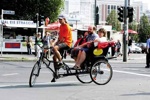
Beijing topped the list of most air-polluted cities in Asia included in a report released at last December’s “better air quality” conference in Indonesia. That came as good news to China’s handful of car-bashers.
Zhu Weiyi (Êú±‰ºü‰∏Ä), a part-time professor of law at the Chinese Academy of Social Sciences, is one of them. Zhu is upset that many of his overseas-educated colleagues have bought cars even though they live within walking distance of where they teach. He himself doesn’t have a driver’s license and refuses to learn. He even is against his wife driving, even though she has a license. But still, he is just one of a tiny minority battling mainstream urbanites who “think driving fulfills life and is fun.”
“If we cared about the environment like we do the stock market, if we controlled automobiles like we do population growths, if we felt ashamed about driving,…” Zhu is well aware his wishes are totally impractical, but he remains an avid environmentalist who wants his generation to consume less energy for the following generations.
In most Chinese cities, people like Zhu seem to be losing the game. It took Beijing only four years to grow its number of cars from 2 million to 3 million. With more than 13 million cars, China has already become the second largest new car market in the world, only behind the U.S.
On the other hand, there is only car for every 40 Chinese, while every American has one and there is one for every two Europeans and Japanese. But this also means China still has tremendous growth potential in this industry, expanding by 15% in the first half of 2007. At this rate, China will have 130 million cars by 2020.
This is definitely good news for supporters of the auto industry like Li Xianjun (ÊùéÊòæÂêõ), director of Tsinghua University’s auto development research center. Anti-car activists have done great harm to this sector, according to Li. Why is it wrong to restrict development of the auto industry? First, Li notes, the industrialization of developed countries depended largely on full development of their auto industries. Second, this sector feeds the growths of related industries like steel, rubber, finance and infrastructure, and it creates jobs. Third, if families cannot embraced the private automobile, a country’s auto industry as a whole will fail to develop.
Li also encourages having more low-emission and less-powerful cars. But he is not alone in thinking that China has to let cars boom in order to fully develop itself.
Still, with Beijing to host China’s first Olympics next summer, the city is planning to keep a third of its cars from hitting the road during the Games. The Ministry of Construction has also set September 22 as a “no-car day,” encouraging half a million drivers in major cities to give up driving for a day and resort to public transit instead. These, however, are not the long-term solution. [Full Text in Chinese]
[Image: tricycles disappearing from Shanghai and other Chinese cities while becoming popular in Berlin. Via Xinmin Weekly]







